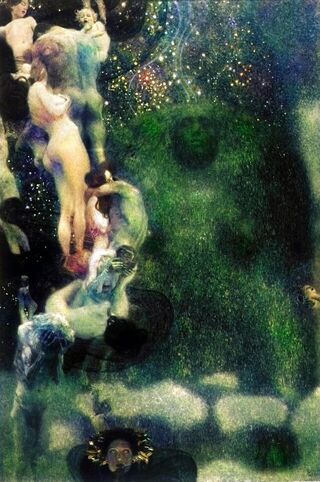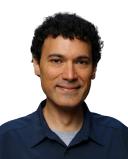Sex
The Biological Origins of Sexuality vs. Freedom
We want to love and to be loved by choice—but can we?
Posted March 1, 2022 Reviewed by Ekua Hagan
Key points
- Scientific evidence is indecisive on the origin of sexual orientation.
- Many people sense little choice in their sexual orientation or individual attraction but both are biologically dependent, not determined.
- While one may accept having no choice in love due to biological forces, love also requires examining who one truly is at heart.
Imagine you fall in love with someone who doesn’t care for you, but you can use a magic potion that will make them love you, or make you stop loving them. Would you? Most of us, I suspect, wouldn’t. We want to love, and to be loved, freely—by choice, not by chemical concoction.
And yet, this is arguably what our bodies do to us—interacting, they inject us, whether we like it or not, with such love and “de-love” potions. A recent biological book on love speaks of "mate choice" only to stress how little choice we actually have.
“People are as free as they want to be,” James Baldwin once boldly proclaimed—but why would they, if “nothing is more unbearable, once one has it, than freedom”? With bio-love, it seems, we can take a respite from freedom, as even for Baldwin, “people can’t, unhappily, invent their mooring posts, their lovers and their friends, any more than they can invent their parents.” We are grains of sand in an hourglass, pushed together, pulled apart, until the final deadly drop.

I take this personally. Two things terrify me most in reading and watching tales of love undone: that I might be un-chosen and that there might be no choice, to begin with. These narratives of love leave little room for freedom. Who can truly choose their beloved under Chemical Cupid’s rule—the determinism of the inception of passion, the fatalism of its ending?
This goes beyond individual attraction to sexual orientation: Do we choose our sexuality?
Examining sexual orientation and choice
The scientific jury is still out. Investigating The Biology of Homosexuality, Jacques Balthazart concludes that “sexual orientation, both homosexual and heterosexual, is under the control of embryonic endocrine and genetic phenomena in which there is little room for individual choice.”
Still, an extensive 2019 Science study asserts that while a complex amalgam of many genes may contribute to same-sex behaviour, over 75% of homosexuality is not dependent on genes, though some of it can be driven by other biological factors, like prenatal hormonal concentrations in the womb (e.g., for a man, the more older brothers you have, the likelier you are to be gay, possibly because the mother progressively builds antibodies against an unknown male protein, more so with each son).
However indecisive the scientific evidence is, the allure of biological determinism lingers. Since the 1990s, the LGBT community’s rallying cry has often turned to “We didn’t choose this,” despite its apparent downsides: the apologetic message, the fact that there is no strong evidence that it had a very substantive impact on making public opinion more pro-gay, and the effective exclusion of queer identities that fall outside this biological determinism. Still, the appeal to nature retains its mass appeal; there are hardly better ways to run away from dilemmas, choices, and taking responsibility, than saying “it’s only natural!” or “it’s unnatural!” It is telling, and quite humorous, that a noted expert on homosexuality demands, “Stop calling it a choice” and, at the same time, insists that “same-sex behavior is not an unnatural choice.”
Scientific analysis aside, when it comes to the subjective lived experience, many (and likely most) people would say they sense little choice in their sexual orientation or in their individual attraction. They simply feel it; passion, let alone romantic love, just feels different than anything else. Friendship is vastly valuable and often lasts longer than romantic love, but Joan Armatrading gets it right: Yes, with a friend you can go dancing, but with a lover, you could really move.
The bad faith of love is freedom’s hardest challenge since this might not be such “bad faith” to begin with. Arguably, there is no flight from freedom; the latter, when it comes to love, is just an illusion. Moreover, when it comes to passion, the hormonal driver of romantic love, the stakes are much higher. Granted, we often feel that people are puppets of forces that leave them no choice; and sometimes we’re right. But with love, we go straight to the heart, to what we often think makes us who we are. Human cœur turns against humanity’s core: love vs. freedom.
References
Machin, Anna. 2022. Why We Love: The New Science Behind Our Closest Relationships. New York: Pegasus Books.
Balthazart, Jacques. 2012. The Biology of Homosexuality. New York: Oxford University Press.
Ganna, A., K. J. H. Verweij, M. G. Nivard, R. Maier, R. Wedow, A. S. Busch, A. Abdellaoui, S. Guo, J. F. Sathirapongsasuti, P. Lichtenstein, S. Lundström, N. Långström, A. Auton, K. M. Harris, G. W. Beecham, E. R. Martin, A. R. Sanders, J. R. B. Perry, B. M. Neale, and B. P. Zietsch. 2019. "Large-Scale Gwas Reveals Insights into the Genetic Architecture of Same-Sex Sexual Behavior." Science 365 (6456).
Loftus, Jeni. 2001. "America's Liberalization in Attitudes toward Homosexuality, 1973 to 1998." American Sociological Review 66 (5):762-782.
Weber, Shannon. 2012. "What’s Wrong with Be(Com)Ing Queer? Biological Determinism as Discursive Queer Hegemony." Sexualities 15 (5-6):679-701.


